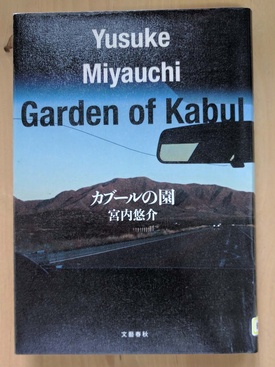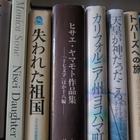As we get older, we all start to look back on our past. We wonder where we came from and why we became who we are today. We start to wonder about the past of our parents and grandparents.
The protagonist of "The Garden of Kabul" is a third-generation Japanese-American woman, Rei, who lives in California. She was bullied and discriminated against as a child, and is traumatized by it. She is troubled by her relationship with her mother, but one day she visits the remains of the Manzanar internment camp, which helps her repair her relationship with her mother and she comes to accept herself as a Japanese-American.
Author Yusuke Miyauchi published this work in the October 2016 issue of the monthly Bungakukai magazine, and it was published by Bungeishunju in January this year and was shortlisted for the Akutagawa Prize. Unfortunately, it was not selected, but it recently won the 30th Yukio Mishima Prize.
Miyauchi has received numerous awards, including the 33rd Japan Science Fiction Grand Prize for Banjou no Yoru (The Night on the Board) in 2012 and the 38th Yoshikawa Eiji Literary Newcomer Prize for Kanojo ga Esper Datta Koro (When She Was an Esper) in 2017. His novel Ato wa No to Nare Yamato Nadeshiko has also been nominated for the 157th Naoki Prize, which will be selected next month.
Born in 1979, this author, one of the leading figures in contemporary Japanese literature, sets the story in America and depicts the inner conflict of a 38-year-old Japanese woman named Rei, set against the backdrop of Japanese American history. The story of Rei, a third-generation Japanese woman who does not understand Japanese, is written in first-person Japanese, but it feels as if you are reading a translation of a novel by a third-generation Japanese American author.
Ray is undergoing cutting-edge psychotherapy to treat his trauma. He works as an engineer and manager, working with computers and mathematical formulas, and is involved in the development of music-making technology, such as "YouTube that can compose music." He lives with John, an aspiring picture book author and naturalist. He is a thoughtful, gentle man with a penchant for poetry and the blues.
The background mechanisms, such as virtual reality psychotherapy and cloud-based music exchanges, are cool, but the mental issues that Ray faces are deeply connected to serious historical and social facts, such as Japanese American identity and discrimination.
Ray's heart is empty and he has no place to belong. In this country (America), one can become anything, but he can't.
"I just wanted to disappear, to the westernmost part of this country, where you can be anyone and anything."
"Without sympathy from anyone, and without being sympathized with by anyone. Anyone can become anything, at the forefront of this country's information technology industry."
Without an anchor to support her, and no sense of her own generation, she continued to run away from her mother, who tried to restrain her. Looking back, she realized that she was running away from the question of who she was. What brought about a change in Ray was a visit to the site of the Manzanar internment camp where her first-generation immigrant grandparents were interned during the war. At the visitor's center, there were exhibits about discrimination against Japanese Americans, and audio recordings of testimonies from first-generation immigrants were also on display.
Among them were words from a first-generation Japanese grandfather who looked after Ray when he was a child. This prompted Ray to visit the grandfather's son in Little Tokyo, Los Angeles, and hear facts about his grandparents and mother that he had never known before.
Just as there was a feud between me and my mother, my grandparents and my mother also had their own feuds and estrangements. My grandparents wanted to teach my mother, a second-generation Japanese, Japanese. However, my mother did not understand the point of learning Japanese, and she said that the dropping of the atomic bomb was inevitable, which angered my grandfather. My mother wanted to become an American, but she found out that there were no positions available for Japanese-Americans in the jobs she dreamed of. My mother was also hurt by her fate.
And then, for the first time, I thought, "Half a century ago. That's right, it was when my mother was a girl. How did she spend that time?"
After his visit to Manzanar, he goes to see his mother, whom he had avoided until then. His mother has shrunk, and his misunderstandings about her, who he thought never understood him, are cleared up, and he realizes that his mother and he are two sides of the same coin.
Ray developed a web-based "product" called Track Cloud that allows anyone to purchase music composition information that has been created and made public by others, allowing anyone from all over the world, regardless of race, age, or religion, to participate, share, and create the music they like.
It's a little shady, but he takes what he likes and creates it the way he likes. Ray's life is also like a patchwork world, but it's refreshing to hear him say that he has made up his mind that the only thing he can do is to live by his own decisions, and to accept himself and his times.
In Little Tokyo, Ray is given a copy of Nanka Bungei, a Japanese literary magazine created within the camp. He becomes interested in the work and translates it into English, but for some reason his mother also has a copy of the camp literature, along with the English translation, stuck on the refrigerator.
"Literature without tradition" in Japanese in America is thought to be lost as generations change. However, it was passed down in a small way to Ray and his son, even though it was in English. I sympathize with the author's perspective, which shines a light on a small literary activity that is outside the framework of Japanese literary history and brings to light the sense of loneliness of the authors.
(Titles omitted)
© 2017 Ryusuke kawai







